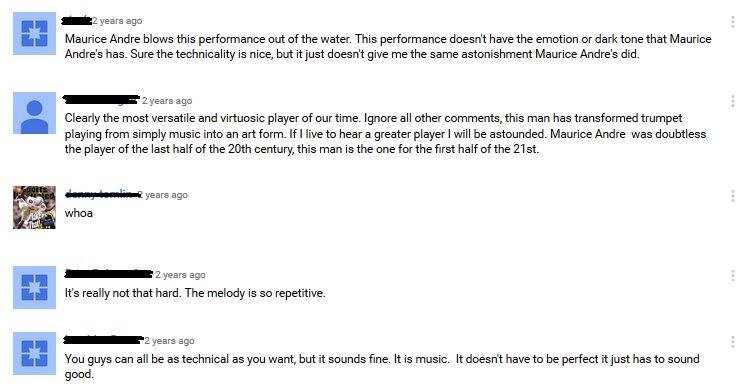Monday March 14, 2016

Here it is…my First Blog request! Things are going to start happening to me now!
Stage fright leading to total fatigue on stage is a reality for many performers. Now, I don’t have the statistical data to back this claim up, but I’m putting my money on the assumption that just about everyone that plays a brass instrument has experienced this in one form or another. Remaining cool under pressure is an acquired skill for many of us. Some prefer the use of beta-blockers, others use liquid courage, and some of us crash and burn magnificently with a boost of adrenaline.
Stage fright is amplified by nervousness and the focus on anxiety instead of the the performance itself. Things like a missed note can lead to a string of disastrous happenings. It is at this moment when nothing can seemingly go right leading to great fatigue. Think about it, how often do we miss notes? Probably more often than we’d like to admit, but in the practice room or rehearsal space we pick up the pieces and move on. Why? Because it’s not the end of the world, we’re all human! Below, I’m going to outline some of the things I believe are catalysts to stage fright and fatigue.
The Big “C” and You!
So here we are, it’s the big the moment, you’re going to perform a solo piece, a recital, or in front of a room full of your peers. On any given day, you can seem to play for hours on end without trouble. Today should be no different, right? As much as I would like to believe that, this is often not the case. It is in these moments when we are most vulnerable and exposed. Perhaps we should lean on Cicero for this one, “Man is his own worst enemy.” When performing, the lack of the “Big C” (Confidence) can be the reason many are unsuccessful in these moments.
Why do we lack confidence? Preparation, or the perceived lack thereof, seems to fit the bill. If you are not completely confident in your preparation, what are the odds you are going to be confident in your performance? The odds aren’t very good. Life has great way of throwing us curve ball after curve ball. Trying to balance life with your craft is challenging no matter what your level is. This can lead to the loss of some seemingly crucial moments of practice. The good news is, you don’t always need your instrument to practice. Mental rehearsal is enormously helpful in these moments. Sing, whistle, hum, do what you can. The stronger your memories of the music are, the more concrete your muscle memory is going to become. You’ll feel more confident in your preparation and less likely to make mistakes.
“I prepared just fine, but I’m afraid everyone is judging me!” -Every Musician. Okay, here is a reality we face. You’re up in front of a room packed with trumpeters. You glance out and see some serious armchair “masters” of the craft staring dead at you with score in hand. This can be really intimidating to play for a crowd of note counting, metronome obsessed, judgmental people. The best thing to do, is simply to be okay with your mistakes. Mentally prepare yourself for someone to say “In measure 123, on the 6th 132nd note, you were 3 cents flat!” Yeah, well — so what? The masters have failed more times than we have even tried. Be confident in the fact that you had the courage to stand up and play for these people. I think the internet has truly helped me overcome my fear of this. Get on YouTube and find your favorite soloist. Grab some popcorn, a drink, and start reading the comments.
Here is one of many, I found this one on a Wynton Marsalis video:

Still worried about what they are going to think? You shouldn’t be! Tell YOUR STORY and be happy knowing that you did it. The fact is, you’re never going to please everyone, so be a risk taker and be confident in your ability to sell yourself. You’re going to grow from taking risks, so why play it safe? The silver lining in all of this is that there are often people in these instances that can offer you something of substance. It’ll be up to you to take the good with the bad and filter through them later. Let the only thing on your mind be your delivery of your story.
Tension — The Enemy from within!
Tension is a major cause of fatigue in performance. The more tension we have, the less efficiency there is, and the harder our bodies have to work to produce a desired result. When you are starting to feel unusual fatigue, it may worth to start with some self assessment in front of mirror. Look at your body, are you shoulders tight and pulled upward? Maybe your muscles are tense and you’re jamming the horn into your chops with the arm. Take a moment to reset your body, shake out all the tension and completely relax your body. Stay loose and play the music again, watch for tension in your body language and get in the habit of letting it go.
Tension in your breathing is another way in which we fuel fatigue, perhaps it is the greatest source. Breathing is the most fundamental aspect required for producing music. Instead of focusing on “not being nervous,” focus on every breath being big, full, and relaxed. The more tense your breathing becomes, the more tension your muscles are going to have, and this can snowball. When you feel nerves kicking in, full relaxed breathing is essential in dissolving the uneasy feeling brought on by nervousness. This is something most are guilty of from time to time, learn to identify those moments, and begin corrective actions as a habit.As a matter of fact, “Hello, my name is Jon, and I too have tension in breathing.” There, it’s all out in the open, I feel better!
Take a quote from this master:
“The brain influences the body and the body influences the brain. So if the brain
is in turmoil, then put the body in a calmer situation. If we start with slow, measured
inhalations, the pulse starts to slow a bit. Normally, in anxiety, breathing becomes rapid
and shallow. The pulse goes up. Blood pressure goes up. So you try to create the opposite
conditions!” – Arnold Jacobs from Song and Wind.
Words to live by! Print that one out, tack it up on the wall, and refer to it in moments of doubt. I never had the pleasure of study with Arnold Jacobs, but I can tell you I believe the above quote with every fiber of my being.
Starting Believing In Yourself
This one could go back under the “Big C” section, but I feel like this is one that is a helpful reminder worthy of closing this article out. I had a wonderful conversation this year with Bobby Watson. The cliffs note version of that conversation is “If you don’t believe in yourself, why should anyone else?” It’s funny how something so simple can be so profound. It’s one thing to tell your story in music, but it is another to believe in what you have to say. If you have something to say, say it with total conviction. If you’re going to make mistakes, make them big and go for it! In one of the first lessons I had with Michael Anderson in 2011, I learned a nice little mantra, which I will paraphrase as: “The bell is the past, your lips the present, and your mind is the future. Don’t live in the past, keep moving forward!” If that’s not accurate, I don’t know what is.
Happy Trumpeting!
